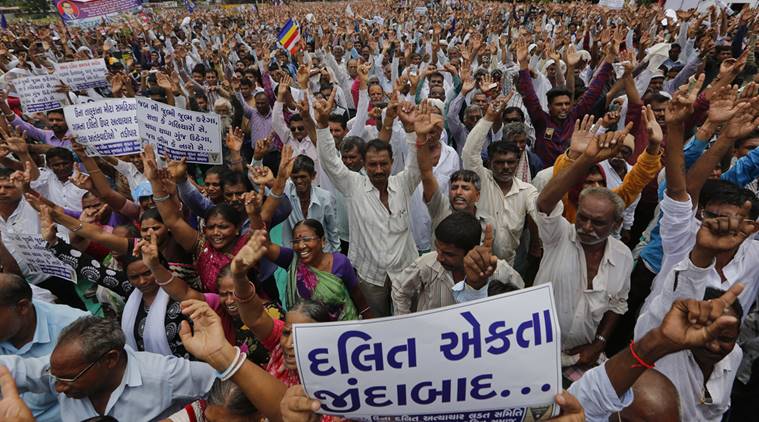Opinion PM Narendra Modi is still silent, but cow vigilantism is a hot topic of discussion elsewhere
Though it's the prerogative of the PM as to what and when to speak, his continued silence emboldens the cow vigilante groups which are operating with impunity.

 Hundreds of members of Dalit community take a pledge not to remove cattle carcass as they gather for a rally to protest against the attack on their community members in Ahmedabad, Sunday, July 31, 2016. (Source: AP)
Hundreds of members of Dalit community take a pledge not to remove cattle carcass as they gather for a rally to protest against the attack on their community members in Ahmedabad, Sunday, July 31, 2016. (Source: AP)
Minister of State for Social Justice and Empowerment Ramdas Athawale minced no words when he said that ‘protection of cows should not be at the expense of human lives’. He was reacting to incidents of violence and brutal torture being carried out in the name of cow protection. Since the lynching of Mohammed Akhlaq in Uttar Pradesh’s Dadri last year over suspicion the he stored beef at his home, the incidents of cow vigilante groups taking law in to their hands are only on the rise.
In Gujarat, a group of Dalits were mercilessly flogged for allegedly slaughtering and skinning a cow. The issue came to light when a video of the attack was uploaded on social media platforms. Now an eyewitness has come forward and said that the cow skinned by the family in Una was killed by a lion. This has led to massive protests across Gujarat and the Dalit community has now put the BJP led government on notice. And more recently, two Muslim women were beaten up at a railway station in Madhya Pradesh. Again, the ‘cow protection’ group believed they were carrying beef. BSP chief Mayawati had raised the issue in Parliament.
The echo of these attacks were heard in the US on Friday. State Department Spokesman John Kirby said that the US is obviously concerned by reports of rising intolerance and violence in India. “As we do in countries facing such problems around the world, we urge the government to do everything in its power to protect citizens and to hold the perpetrators accountable,” he said. Well, many would argue that the US has no moral high standards to preach India on social harmony and tolerance, especially after how members of the African-Americans community were racially targeted recently. Presidential hopeful Donald Trump’s entire election campaign is based on xenophobia and hate against a community.
But the fact remains that the attacks on minorities and socially marginalised communities in the country cannot be brushed under the carpet. It would be naive to consider these attacks as ordinary law and order problem. What is more worrying is that these attacks were carried out on the basis of rumours and half truths. Instead of reporting to the police, gau rakshaks, having political patronage, become the law unto themselves. In the Akhlaq lynching case, many BJP Members of Parliament vitiated the environment further by justifying the attacks, and instead called for arrest of the victim’s family. For weeks, Prime Minister Narendra Modi remained conspicuously silent. It took a little nudge from President Pranab Mukherjee for Modi to react. The President reminded that tolerance and co-existence were the basic tenets of the Indian civilisation.
This time also, PM Modi has not spoken a single word. The latest episode of his Mann ki Baat on Sunday focused on benefits of technology, better healthcare and his visit to the African countries. Though it’s the prerogative of the PM as to what and when to speak, his continued silence emboldens these groups which are operating with impunity. Since he took over as PM, he has been talking about sab ka saath, sab ka vikas and inclusive growth. But how will a victim of these attacks relate to this slogan? The government may term these gau rakshaks as fringe elements, but they are dominating the headlines.






